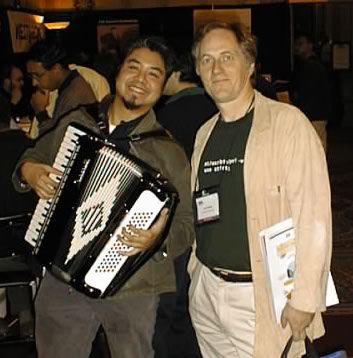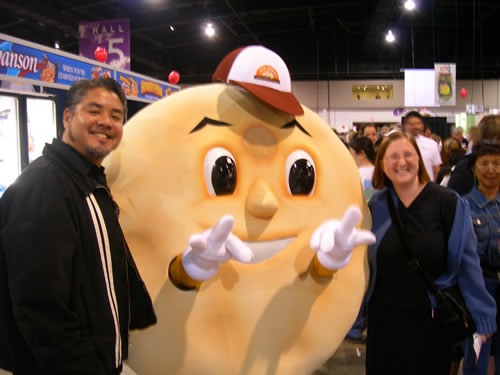
In the beginning, there was Foo Camp
For those of you who who’ve never heard of the guy, Tim O’Reilly is probably the best known publisher of computer books in the world today. I met him at a conference at Microsoft HQ in Seattle back in 2001, and he’s a really great guy. If you’ve ever passed by the “computers” section of your local bookstore, it’s likely that you’ve seen a book published by his company, O’Reilly Media. They’re hard to miss: most of them have white covers featuring a woodcutting of an animal.
In addition to publishing books, Tim also hosts a number of conferences that are considered to be “don’t miss” events, such as the O’Reilly Open Source Convention and the Emerging Technology Conference. I’ve had the privilege of attending a couple of the conferences and even playing accordion at the closing keynote of one of them, and they’ve been very rewarding experiences.

Me and Tim O’Reilly at the P2P Conference, San Francisco, 2001.
In 2003, Tim — possibly inspired by the concepts of emergence and self-organization, which are current ideas in the tech world — started a little annual “unconference” called Foo Camp. Foo stands for “Friends Of O’Reilly”. Unlike most conferences, which take place in a conference hall or hotel, Foo Camp takes place at the O’Reilly offices in Sebastopol, just north of San Francisco. Guests of Foo Camp are invited to set up tents on the lawn, and discussion groups form anywhere on the O’Reilly grounds. Tim provides the space as well as the food and drink for his guests.
Unconferences
One of the dirty little secrets of conferences, especially technical conferences, is that the most valuable happenings often take place not during presentations or panel, but in the unstructured time between presentations. When conference-goers gather in the hallways during this “down time”, they get to know each other, exchange ideas, make partnerships and alliances and — in this age of affordable portable computing and wireless networking — cobble together notes and even software. I have probably learned more about network programming by simply hanging out with Bram “BitTorrent” Cohen and Justin “Swarmcast” Chapweske than sitting through a dozen PowerPoint-laden presentations on the same topic. I also had more fun. In these situations, there isn’t a separation of “audience” from “speaker”; rather, everyone’s a participant.
Some conference organizers try to harness this by holding “Birds of a Feather” gatherings, in which people interested in a topic can gather in a room after the scheduled events and hold their own self-directed session.
This is the idea behind an unconference: to attempt to organize a group of people not around the speaker/audience paradigm, but the “hallway” one, where everyone’s a participant. “There are no spectators” is the unofficial motto of the unconference.
Unconferences may have a general theme, but there is no set agenda and only the bare minimum of organization. Instead, the group collaboratively determines the direction of the gathering, creating an agenda on an ad hoc basis. Smaller groups of people with strongly similar interests may break out and form their own mini-groups to have a discussion or collaborate on a project. There’s an organic, self-organizing, “bottom-up” feel to unconferences, which is why they appeal to many software developers, many of whom subscribe to an ethos of “do it yourself”.
Foo Camp’s loose organization borrows an idea from Open Space Technology: participants sit in a circle and are invited into the middle to write down on a sheet of paper the topics they want to discuss. They then annouce their topic to the participants and pick a time and place for their session, and a schedule of times and places for discussion groups is written on a central whiteboard.
The general consensus among attendees was that Foo Camp was a hit. Tim’s been hosting one every year since then.
Bar Camp is born
Foo Camp is an invitation-only event, and as its name suggests, you have to be on the radar of Tim O’Reilly or his staff in order to even be considered for an invitation. If you haven’t yet made a name for yourself (perhaps you’re young, new to the tech world or you live far away from Silicon Valley), it’s quite unlikely that you’ll ever get an invitation. Even people on O’Reilly’s radar don’t get invited; the limited number of guest slots means that sometimes even some “800-pound gorillas” don’t make the cut.
Bar Camp was created in response to this situation. It follows the same “unconference” model of Foo Camp, except that it’s non-exclusive. Anyone who’s interested can join in, no invitation required.
The first Bar Camp was held in San Francisco in August 2005. It was organized by a group of people that included Chris Messina, whom I met at the developer meetup that Ross and I held in San Francisco back in February. It was very put together on very short notice — barely a week — in order to run at the same time as Foo Camp. As with Foo Camp, the general consensus among Bar Camp’s attendees was that it was also a success.
(Chris will be at the upcoming BarCamp Toronto.)
There exists a little rivalry between Foo and Bar camps, but there’s no emnity; as Chris Messina has pointed out, Bar Camp was not built on the idea of protesting Foo Camp, but building upon it, in the same spirit as open source software.
One very important way in which Bar Camp extends the idea of Foo Camp is that it was meant to be duplicated in cities all over the world. The people at the original Bar Camp took great pains to document the inaugural one in order to provide a blueprint for others to use for their own events. Bar Camp events have been held in cities all over the world, with Accordion City having had their first one in November. It was the Bar Camp Toronto experience that gave birth to DemoCamp.
Foo? Bar?
That’s a little computer humour. Many programming books, notably the O’Reilly Perl ones, use “foo” and “bar” as the names of variables in their example programs. It’s one of the traditions of the field. The terms are derived from the World War II slang term “fubar”, which is short for “fucked up beyond all recognition”.
Since Tim O’Reilly’s camp was called “Foo”, it makes sense — if you’re a programmer familiar with the literature — to call the alternative camp “Bar”.
No spectators
We’ve become so conditioned to the lecturer/audience or performer/audience paradigm that the “no spectators” philospohy of events like Bar Camp tends to confuse people. This goes doubly for events with programmers; according to Tog on Interface, about 85% of software developers have an INTP — Introvert/iNtuitive/Thinking/Perceiving — personality (the tests always classify me as ENTP, with the “E” meaning extrovert).
The “no spectators” rule does not mean that you are required to come with a presentation or project ready for show-and-tell. You don’t even have to have an idea for a discussion topic. What it does mean is that the event works best if you contribute in some way, whether it’s having something to show, an idea to express or a question to ask. Remember, this is an unconference, and an unconference is simply a hallway gathering at a conference as the conference. Where conferences are powered by the speakers and panelists, unconferences are powered by all the attendees.
So where and when is it taking place?
BarCamp Toronto starts tomorrow (Saturday, May 13th, 2006) at noon and runs until the following noon. It takes place in a large building at 171 East Liberty Street (across the street from the toy factory and the Dominion). A quick check on the attendance list shows that there will be 130 attendees as of this writing.
There’s a Saturday night gathering for BarCampers at the dance club Revival and a Sunday night gathering for karaoke at The Rivoli.
Obligatory horn-tooting
The company for whom I work, Tucows, is a proud sponsor of BarCamp.
More on BarCamp
- What is an unconference?
- Meet the New Web – An article for Profit magazine on the BarCamp/DemoCamp scene here in Accordion City.
- Inaugural Ottawa BarCamp a geekfest success – Canada.com’s report on the recent BarCamp in Ottawa.
- The BarCamp wiki
- The Toronto BarCamp wiki page
- The Bar Camp blog
- BarCamp hosts:












